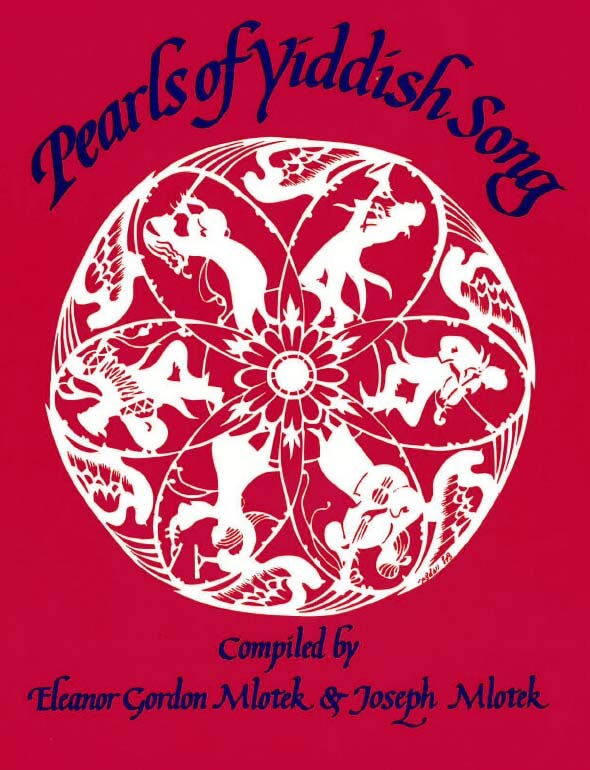Popular melody appearing in numerous collections as an anonymous folksong. The song is possibly derivative of the text presented here which was written by Avram Goldfaden (1848- 1908), founder of the modern Yiddish theatre, for his operetta Ni-be ni-me ni-kukeriku, staged in Jassy, Rumania in 1878; it appears in two operetta manuscripts in the Sholem Perlmutter collection at YIVO. In the catalogue of the Hebrew Publishing Company, Goldfaden is also cited as the composer of the song.
The words and music underwent many transformations and adaptations. Irving Berlin wove the melody into one of his first songs, “Yiddle on Your Fiddle, Play Some Ragtime,” published in 1909. The melody, entitled “Der rabi [sic] hot geheysn lustik zayn” appears in J. Fleischman’s 25 Hebrew Songs and Dances (1911). Part of the melody was used in the song “Yoshke, Yoshke, shpan dem loshek,” published in 1912 by Y. L. Cahan. Words and music were published in 1919 by Janot S. Roskin. The song’s title was used as the title of Isidore Lillian’s operetta, staged in 1921, for which Joseph Rumshinsky’s arranged the melody. The melody was also sung to Mark Warshafsky’s song about two sisters, Sore and Rifke, and Zanvel Zilberts arranged the melody for the song “Reb Dovidl fun vaslikove,” words by F. Fuchs (1924).
In 1952, a French wedding song “Tire l’aiguille” was published with this melody. It was also discovered in 1981 in the Hai and Topsy Frankl collection in Frankfurt as a Simkhas Torah song.
In a Soviet-Yiddish version, published in 1940 by I. Dobrushin and A. Yuditski, the stanza beginning with “Yoshke, Yoshke, shpan dem loshek” was changed to “Lomir, ale freylekh zayn, vayl mir veysn nit fun keyn payn” (Let us all rejoice, for we know no sorrow). The loshek — the horse — will be strong as iron and will fly like an eagle over the free earth, and enemies, like hares, will be driven from the fields.
Used by permission of the copyright owners, Ethnic Music Publishing Co., inc.

Happy is the Rebbe and the Hassidim,
and the Hassidim are too.
Happy is the Rebbe and the Hassidim,
and the Hassidim are too.
The Rebbe told us to be merry
ta-di-di-di…
to drink whisky and not wine,
ta-di-di-di…
Push, push,
push the colt;
push it, push it faster.
The Rebbe himself is also pushing the colt,
push it, push it faster.
Yoshke, yoshke, harness the colt,
let’s run faster!
If it stops,
we won’t buy it.
Voyl iz dem rebn un di khsidim,
Un di khsidim oykh dertsu,
Voyl iz dem rebn un di khsidim,
Un di khsidi m oykh dertsu.
Der rebe hot geheysn freylekh zayn,
Ta-di-di-di. . .
Trinken bronfn, nit keyn vayn,
Ta-di-di-di…
Shtup zhe, shtup zhe,
Shtup dem loshik;
Shtup im, shtup im gikher
Der rebe aleyn shtupt oykh dem loshik,
Shtup im, shtup im gikher.
—————————————
Yoshke, Yoshke, shpan dem loshik,
Lomir gikher loyfn!
Tomer vet er zikh opshteln,
Veln mir im nit koyfn.
(From Y.L. Cahan)
װױל איז דעם רבין און די חסידים,
און די חסידים אױך דערצו,
װױל איז דעם רבין און די חסידים,
און די חסידים אױך דערצו.
דער רבי האָט געהײסן פֿרײלעך זײַן,
טא־די־די־די. . .
טרינקען בראָנפֿן, ניט קײן װײַן,
טא־די־די־די. . .
שטופּ זשע, שטופּ זשע,
שטופּ דעם לאָשעק,
שטופּ אים, שטופּ אים גיכער.
דער רבי אַלײן שטופּט אױך דעם לאָשעק,
שטופּ אים, שטופּ אים גיכער.
יאָשקע, יאָשקע שפּאַן דעם לאָשעק,
לאָמיר גיכער לױפֿן,
טאָמער װעט ער זיך אָפּשטעלן,
װעלן מיר אים ניט קױפֿן.
Song Title: Der Rebe Hot Geheysn Freylekh Zayn

First published in 1988 as Pearls of Yiddish Song: Favorite Folk, Art and Theatre Songs, this anthology contains 115 songs. Some material had never been published, while others, included in rare song collections or sheet music, were largely inaccessible. The songs presented reflect Jewish life in Eastern Europe and the United States and depict childhood, love, family celebrations, poverty, work and struggle. There are also songs from the Hasidic and Maskilic movements, songs of Zion and of America, as well as songs from the Yiddish theater.
The title of this anthology derives from the weekly two-page feature column “Pearls of Yiddish Poetry,” which the compilers Yosl and Chana Mlotek initiated in 1970 in the Yiddish newspaper Der Forvertz (the Yiddish Daily Forward). Hundreds of readers from around the world — including authors, composers, singers, actors — became co-participants in this collective folk project and recalled melodies, lines, fragments, stanzas and their variants of songs, poems, and plays which they had heard in their youth. At first, readers sent in only written material. Later, they also taped songs on cassettes, many of whose melodies had, until then, never been recorded. They also identified and supplied missing information regarding lyricists, poets, and composers and described the circumstances surrounding the songs’ origins, their dissemination, diffusion and impact.